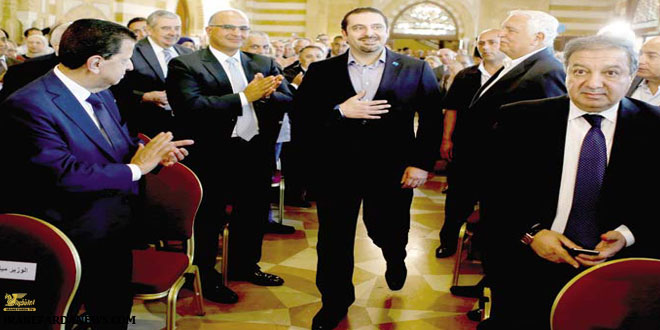
by:Mohamad Kawas
Political elite in Lebanon does not seem very eager to end constitutional farce that has been blocking election of only Christian president in Arab world.
BEIRUT – The flurry of consultations by former prime minister Saad Hariri towards ending Lebanon’s presidential vacuum signals a commitment to the independent political system. Meanwhile, other fragmented Lebanese forces are trying to come up with ways to bypass the National Pact of 1943 and the Taif agreement of 1989, which together resulted in the current power structure.
Hariri seems to be working alone in an intricate search for a president to fill the power vacuum at Baabda Palace but the political elite in the country does not seem very eager to end the constitutional farce that has been blocking the election of the only Christian president in the Arab world.
It appears that the two main candidates for president — Suleiman Frangieh and Michel Aoun — are leaving the issue to Hariri, the leader of the Future Movement, as if the matter did not affect Christians in Lebanon and in the Middle East as a whole.
Hezbollah looks preoccupied with an agenda that it shares with Iran, including regional ambitions in Lebanon, Yemen, the Arab Gulf states, Iraq and Syria. Lebanon’s troubles are low on Hezbollah’s agenda and, hence, the Baabda race has turned into a childish fuss exploited to divert attention from the Shia movement’s blunders in Syria.
Whenever Hezbollah is requested to support one of the two main presidential candidates, who are both allies of the group, it falls silent, holds on verbally to the candidacy of Aoun or stands behind the talents of parliament Speaker Nabih Berri in defending the so-called package deal on the presidency.
In the face of all this idleness, Hariri stands alone, knocking on doors. Until recently, he endorsed painful initiatives, proposing Frangieh for president and then pitching Aoun for the ceremonial post.
The two main presidential candidates are both allies of the “axis of resistance”, which includes Syria and Iran on the regional level and Hezbollah on the national level. And, it actually looks surreal that Hariri, the leading political ally of Saudi Arabia in Lebanon, is struggling to arrange things for the “sons of Iran” and pave the path for them to sit on the top of the Lebanese political establishment.
Hariri continues to suggest that he is not aware of the whispers being spread by some parties, which are hoping to abandon the Taif agreement and move towards the adoption of a political system that produces new quotas dictated by Hezbollah. If there were a failure to call a constitutional convention, as Hezbollah leader Hassan Nasrallah hopes, the labours and schemes to abandon the Taif deal would never stop.
The Future Movement and the supporters of the Taif agreement reject the package deal as a precondition for the election of a new president. Recently, Maronite Patriarch Bechara al-Rai also joined the opposing camp, arguing that such a deal violates the constitutional principles and strips the Christian president of his prerogatives.
The idea of the package deal rests on a suggestion that failures to agree on a prime minister, the formation of the next government and an electoral law will block the election process, which has long been overdue since the departure of former president Michel Suleiman in May 2014. Berri’s position suggests that obstruction has become the essence of the political game. It also implies that dealing with the current stalemate necessitates a violation of constitutional principles.
In recent years, Hezbollah has blocked any decision or resolution that seems unfavourable to its interests. The movement is incessantly working to impose a form of political Shiism on the Lebanese governing system, if not by means of weapons, then by way of some manoeuvres such as the Doha agreement of 2008, which resulted in the fall of the entire political system into the hands of Hezbollah and Tehran. Berri seems to believe that obstruction is no more occasional or incidental. It has rather turned into an authentic Lebanese tradition at the very heart of the political system.
Hariri’s critics may consider his moves a form of surrender to the options of Hezbollah. Yet, the critics are failing to see that Hariri wants a president for Lebanon while Hezbollah wants all of the country for itself. And, when the Lebanese would vote to elect a president, their ambitions would not be consistent with the objectives of Hezbollah, which only hopes to control the political institutions with the aim of serving its own agenda.
 khalijefars News, Blogs, Art and Community
khalijefars News, Blogs, Art and Community








